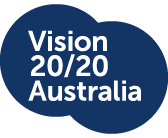Chair: Mr Brandon Ah Tong
The Committee met on two occasions over the reporting period: 17 September 2020 and 3 March 2021. Alongside this, there were 18 meetings of the working group involved in refining the PNG proposal.
This period presented a number of challenges to global eye health as health systems around the world grappled to deal with the growing COVID-19 pandemic, weakening health systems and tightening economic environment.
Despite this, there was much to celebrate with the adoption of the World Health Assembly (WHA) resolution for ‘Integrated people-centred eye care, including preventable blindness and impaired vision’. Led by Australia and Indonesia and co-sponsored by 47 countries, the resolution set the global agenda for eye health for the decade to 2030, committing to a plan to make eye care an integral part of Universal Health Coverage.
This was followed by the passing of the new global eye health targets at the 74th WHA. At the 73rd WHA, the World Health Organisation (WHO) was asked to develop recommendations on global targets for integrated people-centred eye care. The targets, which include effective coverage of refractive error and cataract surgery by 2030, will serve as proxy indicators to track changes in the availability, accessibility and quality of eye care services at the global level. The second National Eye Health Survey which is scheduled to commence later this year, will assist Australia in tracking progress against these commitments.
Also of significance, was the adoption of the United Nations resolution Vision for Everyone: accelerating action to achieve the Sustainable Development Goals (SDGs). The resolution, which was co-sponsored by 115 Member States including the Australian Government, commits the international community to ensuring access to eye care services for the 1.1 billion people living with preventable sight loss. It recognises the crucial contribution vision makes to achieving sustained, inclusive and equitable economic growth and development and ensuring no one is left behind.
We thank the Australian Government for their leadership and support which led to the adoption of these resolutions and recognise the outstanding work from Vision 2020 members who were involved in the preparation of the resolutions, particularly the significant contribution and leadership of the Fred Hollows Foundation.
The Committee continued to progress work on priority areas including the proposal to tackle high rates of blindness in Papua New Guinea (PNG), which formed part of the Vision 2020 Australia federal budget submission. Representatives from the Brien Holden Foundation, the Fred Hollows Foundation and the Royal Australasian College of Surgeons were instrumental in this process, collaborating to develop a coherent proposal which spanned infrastructure, workforce development and outreach services.
This was followed by an active program of advocacy which led to a meeting with the Minister for International Development and the Pacific, Senior DFAT representatives and the First Secretary of Health Security at the PNG Australian High Commission.
The long-awaited Lancet Commission on Global Eye Health was released in February 2021. The report provided evidence of the magnitude of eye conditions and vision impairment globally and drew attention to the economic and societal benefits to individuals and nations in calling for eye health to be reframed as a broader issue for sustainable development. It was pleasing to see contributions to the report from Vision 2020 Australia members.
Vision 2020 was delighted to partner with the International Agency for the Prevention of Blindness to host a live panel event to mark World Glaucoma Week. The event bought together eye health specialists with an interest in Glaucoma to talk about their work and its importance to enhancing the detection, management and prevention of glaucoma. Thank you to Vision 2020 members Glaucoma Australia, Centre for Eye Research Australia, University of New South Wales and Save Sight Institute, who participated in this successful event.
At the June 2021 Vision 2020 Australia event in Canberra, we were also pleased to pay tribute as a sector to the Hon Bob McMullen, who played a key role in the original formation of Vision 2020 Australia and recently concluded his tenure as President of the International Agency for the Prevention of Blindness.
In closing, we would like to thank all Committee members and their proxies for their participation in the Global Committee, and their ongoing contributions to our shared work.
Members and Proxies
- Brandon Ah Tong – Chair
- Andreas Mueller – Centre for Eye Research Australia (CERA)
- Andrew White – Sight for All
- Jane Schuller – Orthoptics Australia
- Jenny Harnett – OneSight
- Judy Hatswell – Sight for All
- Laura Nicholson – CBM Australia
- Professor Lisa Keay – UNSW School of Optometry and Vision Science
- Lucy Dryden – Fred Hollows Foundation
- Maureen O’Keefe – Australian College of Optometry
- Ming He – Centre for Eye Research Australia (CERA)
- Philippa Nicholson – Royal Australasian College of Surgeons
- Rachel Wallbridge – CBM Australia
- Remy Di Ponio – Foresight Australia
- Selina Madeleine – Brien Holden Foundation
- Sheela Kumaran – UNSW School of Optometry and Vision Science
- Tania Hudson – Lions Eye Institute
- Tim Fricke – Brien Holden Vision Institute
- Wayne Hogan – OneSight
- Wendy Chin – OneSight
- Wendy Weston – Orthoptics Australia
